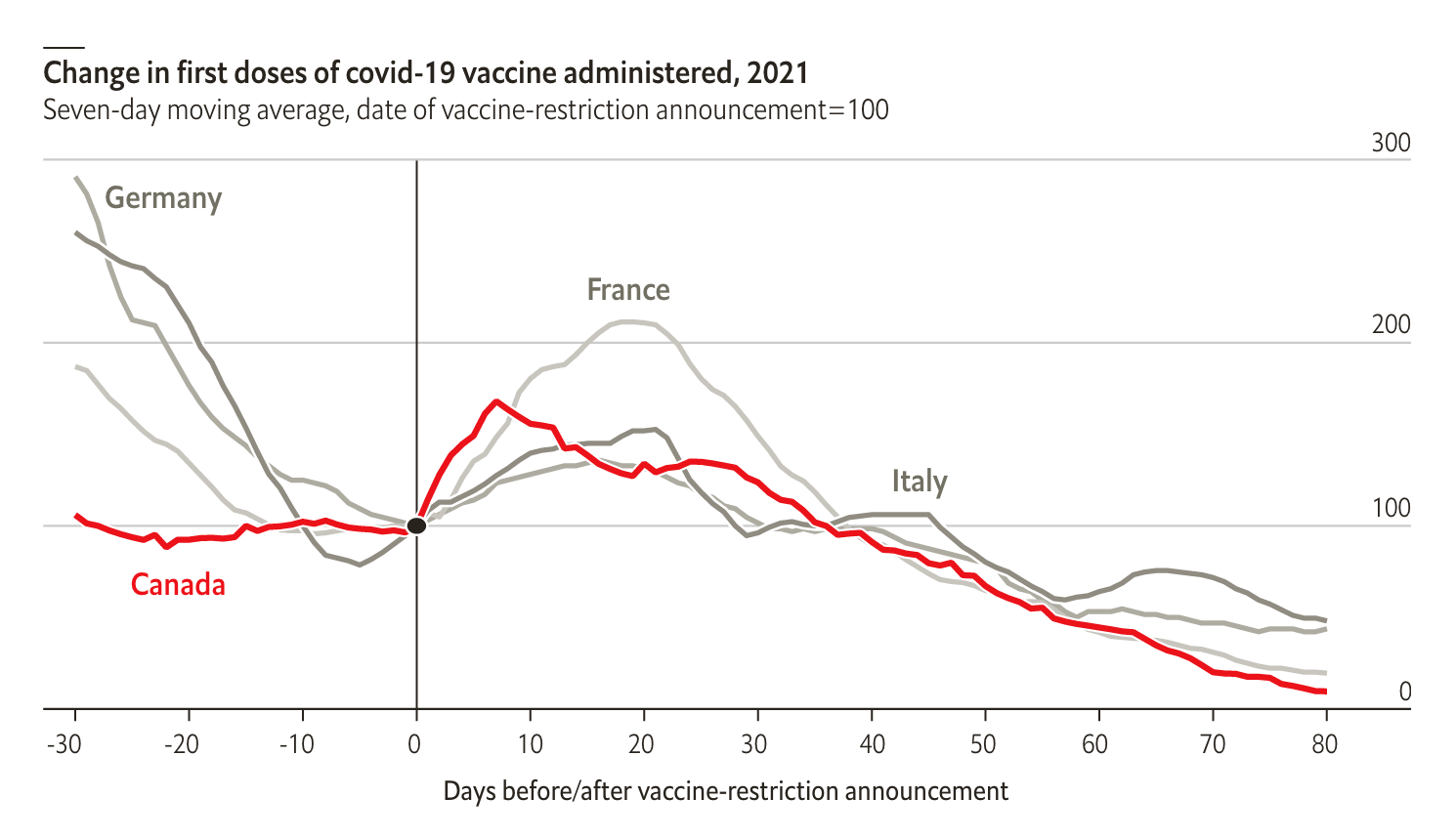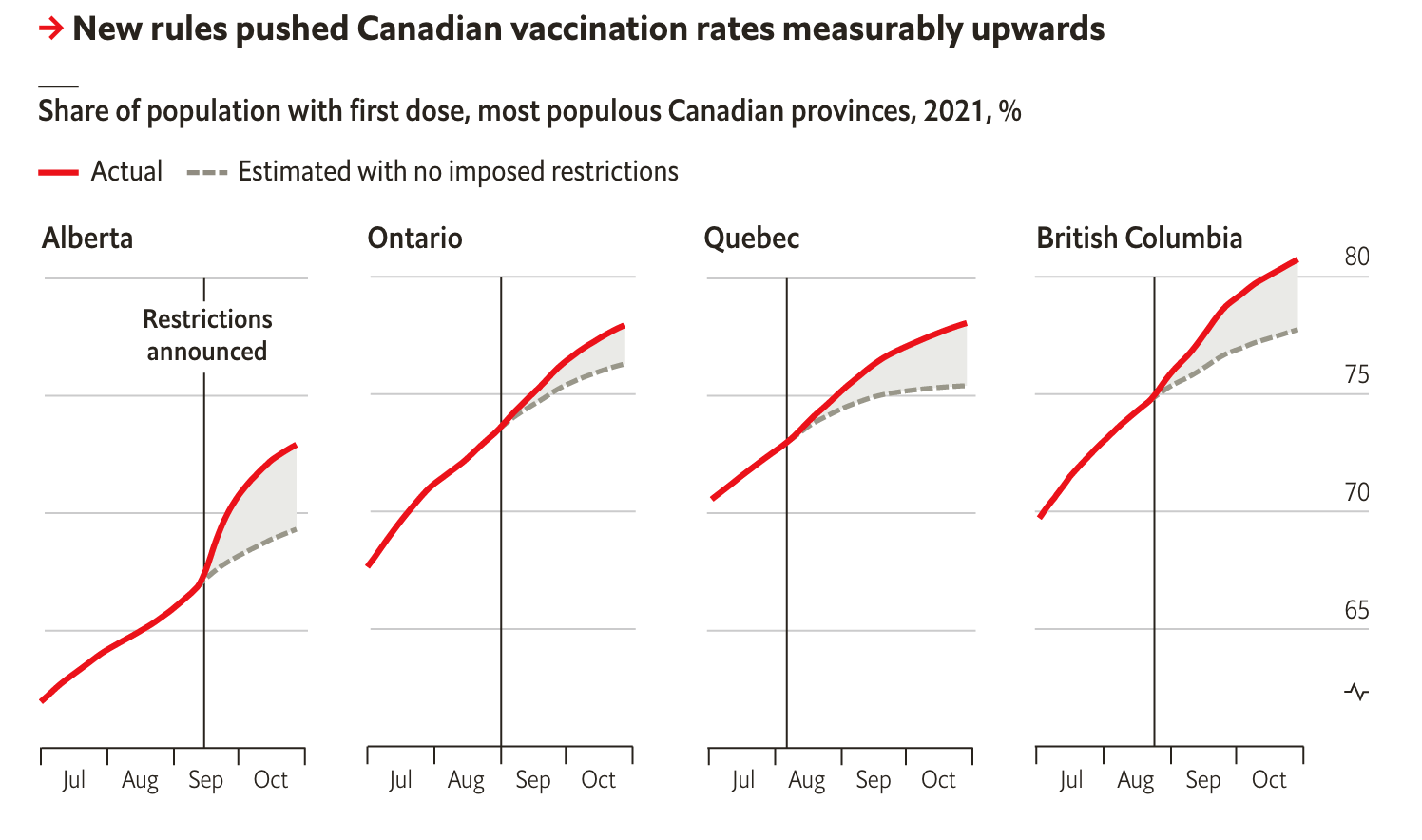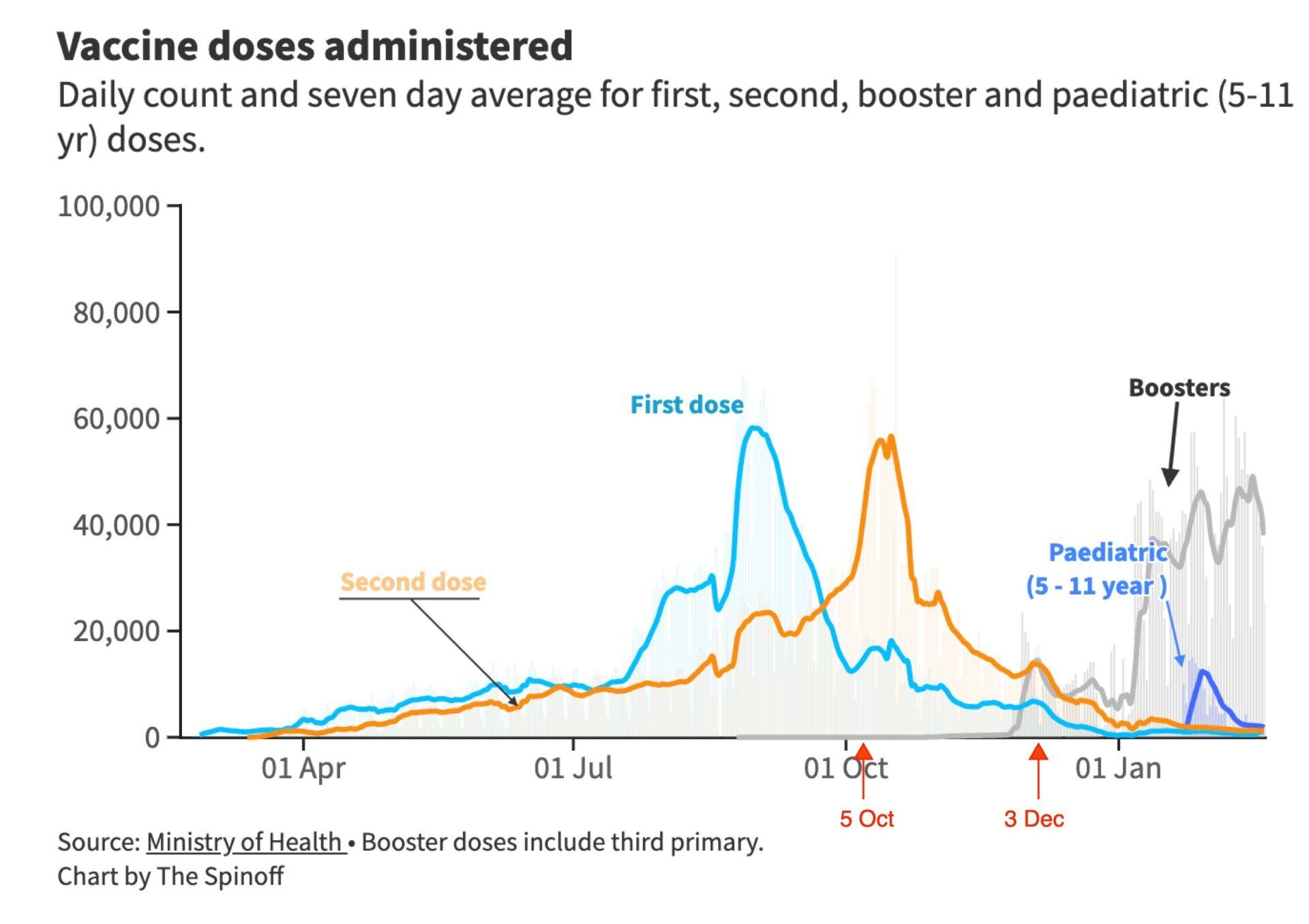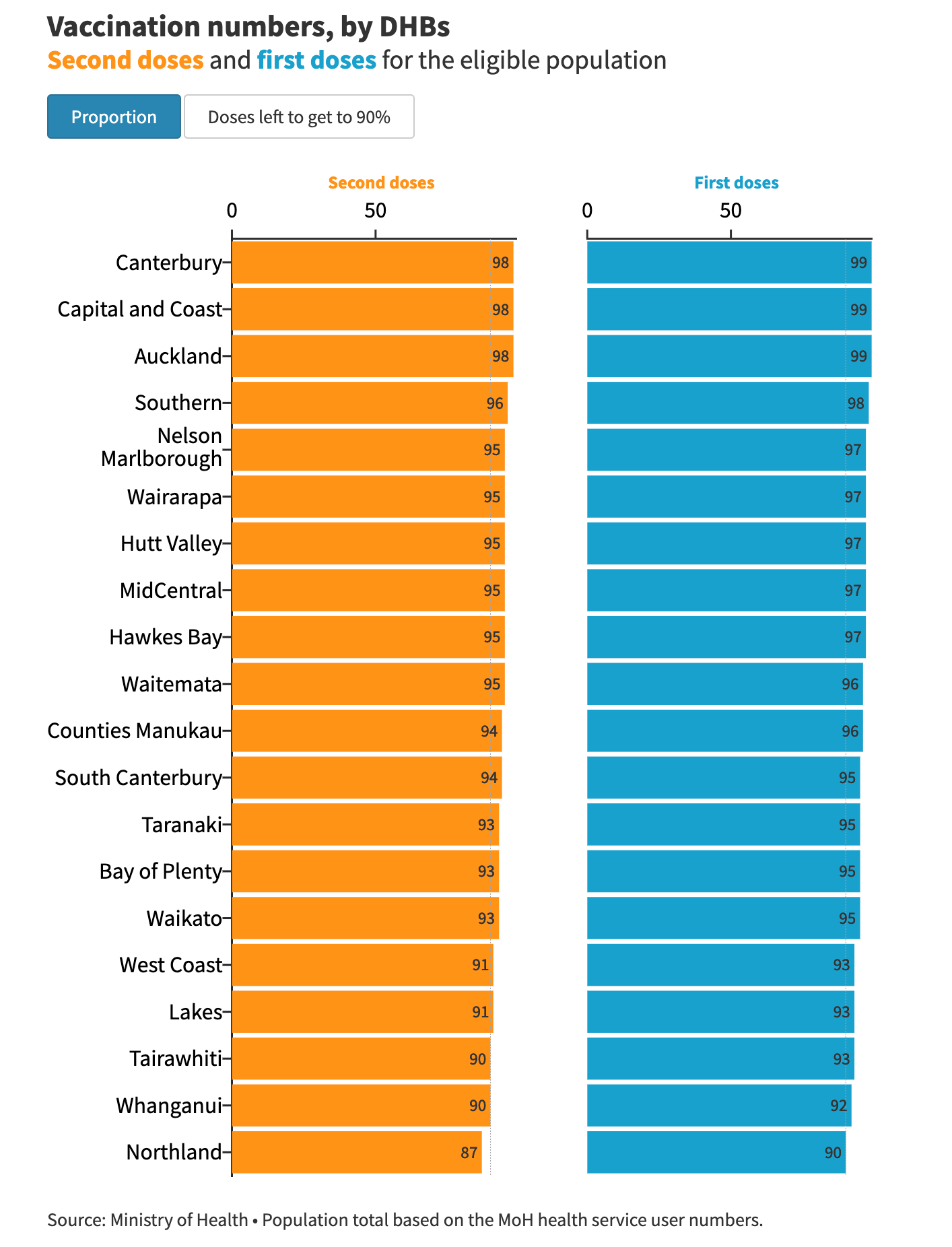Do vaccine mandates work?

Given the depth of feeling at present around vaccine mandates, it seems timely to consider their effectiveness. The Economist had a look at this and suggested, based on Canadian and European data, that they can be effective. Here’s what happened after Canada, France and Italy and Germany introduced vaccine mandates. France barred unvaccinated people from restaurants, theatres and long distance trains. Italy (and Greece) made it mandatory for all residents over 50 (and 60) to get vaccinated.

Here’s what happened in Canadian states after vaccine passports were required to enter bars, gyms and restaurants. It was estimated that 287,000 more people were vaccinated within 6 weeks as a result. Economists calculating the benefits in France, Germany and Italy, considered that requiring evidence of vaccination in those countries not only increased jab uptake but also prevented 46,000 hospital admissions, €9.5bn ($11.2bn) in economic losses and 6,400 deaths.

Different countries are implementing different levels of restrictions in relation to COVID vaccines and passports. Austria has required all adults to be vaccinated , as has Indonesia and Turkmenistan (our experience on the border of Turkmenistan suggests we don’t want to be in their club). Fines in Austria will start at 600 euros from mid-March, with further checks and fines every quarter. Singapore will require people unvaccinated by choice to pay their own hospital bills if hospitalised by COVID-19 , Quebec will charge a health tax to unvaccinated residents (the fee has not yet been calculated) and Greece will charge over 60 year olds $NZ168 each month they remain unvaccinated. I’m not trying to take away from the protests in New Zealand by pointing out that there are a range of vaccine mandates and New Zealand is not currently close to the top of the scale (here’s a link to what we have if, like me, you realise you aren’t sure). However, it is always good to get a perspective, based on what others are doing.
Downsides to vaccination mandates are public backlash and increased polarity in views – no surprises there – and suffering for the unvaccinated. The World Health Organisation takes the view that vaccine mandates are an absolute last resort. They may change the behaviour of those who are undecided, but not those with strongly held beliefs. Many mandates are being challenged in the courts of different countries, where it is likely at least some will be found unconstitutional.
There have been significant rallies in France, Germany, Austria and Italy against vaccine mandates and passports. Emmanuel Macron said he wants to piss off the unvaccinated by making their lives too complicated…one wonders if he had a chat to Trevor Mallard recently on the (poor) strategy of getting people to comply by annoying them. Obviously there is a major wave of opposition in Ottawa, and significant protests in the USA, including in Los Angeles and Washington DC. South Koreans are protesting against closure of restaurants and cafes at 9pm (as in the UK, earlier in the pandemic, it seems that there is a mistaken impression that COVID-19 is a night owl). The New Zealand convoy is one of many protests around the world; it is likely that protests are more visible in countries that have the greatest degrees of freedom. I can’t find reference to any protests at scale in China.
What the Economist did not consider (and it was not part of their article’s intent), was the point at which vaccine mandates are no longer useful, if they ever were. One could take a simplistic view from the graph at the top by suggesting that at, 40 days, the rate of vaccination has dropped below the level at which the mandate was introduced, so mandates are having little effect. Of course, one never gets to investigate the counter-factual i.e. what would have happened if the mandate hadn’t been introduced. The rate could have been worse at 40 days, or better, if the drop-off is a result of irritated people protesting and becoming trenchant.
New Zealand implemented vaccine passports on Friday December 3rd. That would mean January 12th was when the mandate could have had its most significant effect and we are nearly 40 days further on again. This graph doesn’t show much impact from when the mandate was imposed on December 3 (in fact both first and second doses drop off a little peak). Could one consider that the forecasting of the mandate might have affected uptake.?Possibly. We were told about the vaccine passport on 5 October. The numbers of people getting their second doses was already on the rise and kept rising, steeply then fell rapidly soon thereafter (however this would have been driven by when people had first doses). There was a little increase in first doses for around 20 days.

There are two aspects of vaccine mandates I think we should be considering:
1) Should we have had any vaccine mandates?
2) Should we still have vaccine mandates?
The answer to Question 1) is, maybe, but not unequivocally, given the findings in some countries, the countering position of the WHO and the lack of obvious evidence for mandates driving uptake in New Zealand. However, we are past Question 1 now. Mandates were imposed, we can debate whether they should have been for as long as we like but that can only change the future, not the past. What is the answer to Question 2 should be our current focus.
Should we still have vaccine mandates, when we are recording over 90% of 12s and over fully vaccinated in every part of the country (except Northland at 87%)? New Zealanders have been extraordinarily compliant in getting vaccinated, compared to many countries in the world – we remain at number 15 with 80% of the eligible population vaccinated. There is no good reason to assume that people will be less keen to get boosted than vaccinated, if boosters are what we are trying to incentivise. Does having a vaccine pass prevent the spread of Omicron? The suggestion is that you need to be boosted to reduce spread of Omicron, but our vaccine passes do not include boosting.

One of the counter arguments to giving any weight to the Convoy’s calls for removal of mandates, is that these people represent a minority of New Zealanders. I now wonder if they do. Most of New Zealand is vaccinated, but that doesn’t mean these people are pro-mandate, just that they are pro-vaccine! What would happen if we did some polling of New Zealanders to find out their views on vaccine mandates and when they should be removed? Would we find a minority or a majority?
Further, is it time to remove some mandates and not others? Are the mandates controlling entry into businesses very rational, given Omicron spread is only significantly affected by boosting? Could we start stepping back by repealing that area of mandates? If the government doesn’t want people socialising to protect our health system, why not restrict all people, rather than unvaccinated people?
There’s another set of counter arguments that I would suggest are in people’s brains but they don’t necessarily want to give voice to. Those arguments can sound like, “Why should we give in to a bunch of rabble rousers who are illegally tenting outside Parliament and blocking the streets?” “I’ve done my bit and got vaccinated, why shouldn’t they?” “People acting against the good of society should experience repercussions.” Maybe everyone wanting to hold firm on the mandates is totally swayed by the (to me increasingly unconvincing) arguments for all the mandates in force. And maybe they are swayed by emotions outside of rationality.
Just sayin’.






